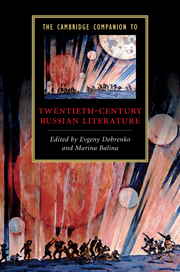Book contents
- Frontmatter
- 1 Poetry of the Silver Age
- 2 Prose between Symbolism and Realism
- 3 Poetry of the Revolution
- 4 Prose of the Revolution
- 5 Utopia and the Novel after the Revolution
- 6 Socialist Realism
- 7 Poetry after 1930
- 8 Russian Epic Novels of the Soviet Period
- 9 Prose after Stalin
- 10 Post-Soviet Literature between Realism and Postmodernism
- 11 Exile and Russian Literature
- 12 Drama and Theatre
- 13 Literature and Film
- 14 Literary Policies and Institutions
- 15 Russian Critical Theory
- Index
14 - Literary Policies and Institutions
Published online by Cambridge University Press: 28 May 2011
- Frontmatter
- 1 Poetry of the Silver Age
- 2 Prose between Symbolism and Realism
- 3 Poetry of the Revolution
- 4 Prose of the Revolution
- 5 Utopia and the Novel after the Revolution
- 6 Socialist Realism
- 7 Poetry after 1930
- 8 Russian Epic Novels of the Soviet Period
- 9 Prose after Stalin
- 10 Post-Soviet Literature between Realism and Postmodernism
- 11 Exile and Russian Literature
- 12 Drama and Theatre
- 13 Literature and Film
- 14 Literary Policies and Institutions
- 15 Russian Critical Theory
- Index
Summary
Literature as an institution and the institutions of literature
Literature always played a central role in Russian culture, since the time when, having undergone a process of secularization, it sanctioned a sacralized relationship towards the Word, replacing the role of the Church with that of the state. Secularization took place at the time of Peter I, when the word of the church was delegitimized and replaced by that of the state, although the same institutional system and the same mechanisms of sacralization of the writer’s image were maintained. Literature became a dominant cultural institution, and a literature-centric system began to take shape. This system dominated Russian culture throughout the eighteenth, nineteenth, and early twentieth centuries, and in Soviet times it was consolidated, making literature an overtly politicized and ideologized institution. The writer, who ever since his sacralization had been considered a prophet, messiah, and holder of the truth (istina), and had exercised a dominant influence on the masses, was the focus of this literature-centric system. S/he had always played a superior part as compared to other artists, beginning in the eighteenth century when classicism conferred an educational role upon the writer; this continued throughout the nineteenth century, with the writer becoming the source of a ‘sacred’, ‘magical’ Word, as represented by Pushkin in his poem The Prophet (Prorok, 1826). Retaining this function in Soviet times, the writer was charged by the state to play a leading role in the making of homo sovieticus. Thus literature, becoming the basis of the whole Soviet cultural system, exploited its secular literature-centric experience and conveyed the values and directives of the Soviet state until the latter’s collapse in 1991.
- Type
- Chapter
- Information
- The Cambridge Companion to Twentieth-Century Russian Literature , pp. 251 - 268Publisher: Cambridge University PressPrint publication year: 2011
- 2
- Cited by



